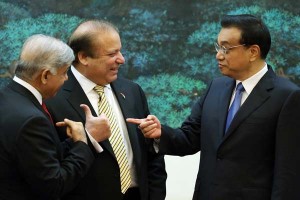
6 Jul, 2013
China, Pakistan ink landmark transport pact to access Gwadar Port
Beijing, 2013-07-06, (China Daily) – China and Pakistan signed an agreement on Friday on the blueprint for a huge transport project linking northwestern China to the Arabian Sea. Observers said the project, named the “China-Pakistan economic corridor”, will open a new route for China’s goods and energy.

Premier Li Keqiang with Pakistan’s Prime Minister Nawaz Sharif and Punjab Chief Minister Shahbaz Sharif (left) ahead of a signing ceremony at the Great Hall of the People in Beijing on Friday. WU ZHIYI / CHINA DAILY
It will also give a strong boost to Pakistan’s economy and help maintain security there, they said.
The broad agreement was among eight pacts signed after a meeting at the Great Hall of the People between Premier Li Keqiang and Pakistani Prime Minister Nawaz Sharif. The cost of the economic corridor project is not known at this stage.
“Our two countries can closely link China’s Western Development Strategy with Pakistan’s development strategy of reviving its economy,” Li told Sharif at their meeting. “This will also deepen regional cooperation in South Asia and benefit people of the two countries and the region.”
The transport link is described as a “long-term plan” to connect Kashgar in the Xinjiang Uygur autonomous region to the southwestern Pakistani port of Gwadar, more than 2,000 km away across a mountainous area.
Sharif said before the visit that he would focus on economic topics during his trip, with the corridor topping the agenda. He told Chinese reporters the corridor will “change the fate” of the region.
“Now that the management of Gwadar (port operations) has been handed over to China, we expect that Gwadar is ready to become a very important economic hub and an important Arabian Sea port,” he said.
China Overseas Holding Ltd took over operational control of Pakistan’s important Gwadar deep-water port from Singapore’s PSA International earlier this year. Gwadar is close to the Pakistan-Iran border and the Strait of Hormuz, through which much of the Gulf region’s oil exports are bound by ship for overseas markets.
Sharif said the economic corridor will boost bilateral trade considerably and offer opportunities for businesses in both countries.
In talks with Sharif on Thursday, President Xi Jinping referred to his guest as “an old friend and a good brother”. He said strengthening strategic cooperation with Islamabad is a priority for Beijing’s foreign policy.
Wen Fude, vice-president of the Chinese Association for South Asian Studies, said the corridor will provide another strategic choice for China’s transport sector. It will also stimulate infrastructure construction in Pakistan, Wen said, adding that increased bilateral trade brought by the corridor will help Islamabad to cut its huge trade deficit with Beijing.
“Beijing is helping Pakistan to produce blood by itself, instead of donating blood through assistance,” Wen said.
Another agreement signed on Friday covers the laying of a fiber optic cable from the Chinese border into Pakistan that will boost Pakistan’s access to international communications networks. Sharif, previously elected prime minister in 1990 and 1997, has been a frequent visitor to China and believes China is Pakistan’s “most reliable friend”.
He is making the first stop on his first foreign trip since being elected in May. Sharif met Li during Li’s visit to Pakistan in late May, before Sharif was formally sworn in.
At the start of his meeting with Li on Friday, Sharif said the warm welcome he received reminded him of the saying “Our friendship is higher than the Himalayas and deeper than the deepest sea in the world, and sweeter than honey.” Li and Sharif agreed to upgrade the China-Pakistan free trade area and deepen anti-terror cooperation.
Sharif promised that Pakistan will do its best to protect Chinese citizens in the country. Two Chinese were killed in Pakistan-administered Kashmir by Taliban terrorists on June 23. The prime minister enjoyed a subway trip in Beijing on Thursday afternoon and he planned to take a bullet train to Shanghai on Friday.
He told China Daily that he is “very much looking forward to” introducing Chinese trains to his country. The main objective of the ride is to explore the possibility of having similar high-speed trains in Pakistan, he said. “It is going to be a tremendous experience,” he said.
He is also scheduled to meet the leaders of many major Chinese enterprises, especially in the infrastructure construction and energy sectors.
Hu Shisheng, a researcher on South Asian studies at the China Institutes of Contemporary International Relations, said infrastructure construction and energy scarcity are the two biggest problems for Pakistan’s economy. “China and Pakistan have enjoyed very strong political and military ties. Now they are building up in the economic field,” Hu said, adding that economic issues are the theme of Sharif’s political agenda.
AP and Pakistan Press International contributed to this story.



Liked this article? Share it!